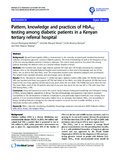| dc.contributor.author | Matheka, Duncan M | |
| dc.contributor.author | Kilonzo, Jeremiah M | |
| dc.contributor.author | Munguti, Cecilia M | |
| dc.contributor.author | Mwangi, Peter W | |
| dc.date.accessioned | 2013-11-13T11:08:06Z | |
| dc.date.available | 2013-11-13T11:08:06Z | |
| dc.date.issued | 2013-11-05 | |
| dc.identifier.citation | Globalization and Health. 2013 Nov 05;9(1):55 | |
| dc.identifier.uri | http://dx.doi.org/10.1186/1744-8603-9-55 | |
| dc.identifier.uri | http://erepository.uonbi.ac.ke:8080/xmlui/handle/123456789/58892 | |
| dc.description.abstract | Abstract
Background
Glycated haemoglobin (HbA1C) measurement is the currently accepted gold standard biochemical indicator of long-term glycemic control in diabetic patients. The level of knowledge as well as the frequency of use of this test among diabetic patients in Kenya is unknown. The current study aimed to document this among patients attending the diabetes clinic at a national referral hospital in Kenya.
Methods
One hundred and ninety eight diabetic patients (59 male and 139 female) attending the outpatient diabetes clinic at the Kenyatta National Hospital were interviewed on their level of knowledge and use of the HbA1C test, as well as their last HbA1C level. The respondent answers were tabulated, analyzed and summarized. The sample mean, standard deviation and percentages were calculated.
Results
Of the 198 patients interviewed, 11 (5.6%) had type I diabetes mellitus (DM) while 187 (94.4%) had type II DM. One hundred and thirty four patients (67.7%) had heard of the HbA1C test while 64 patients (32.3%) had never heard of the test. Forty patients (20.2%) had at one point done the test while 158 (79.8%) had never done the test. The mean HbA1C level of the 40 patients who had at any one time done the test was 8.5 ± 1.7%, with more than 90% having HbA1C > 8%.
Conclusion
Using self-reported accounts, the current study indicates inadequate knowledge and infrequent testing of HbA1C among diabetic outpatients in Kenya. This lack of knowledge and awareness may lead to increased susceptibility to the development of diabetic complications, and potentially higher healthcare costs among these patients. It is our recommendation that policy makers focus on strategies that address HbA1C test accessibility in Kenya, including financial coverage by the national insurance to access the test in public facilities, so as to effectively monitor and combat DM. | |
| dc.title | Pattern, knowledge and practices of HbA1C testing among diabetic patients in a Kenyan tertiary referral hospital | |
| dc.type | Journal Article | |
| dc.date.updated | 2013-11-13T11:08:12Z | |
| dc.description.version | Peer Reviewed | |
| dc.language.rfc3066 | en | |
| dc.rights.holder | Duncan Mwangangi Matheka et al.; licensee BioMed Central Ltd. | |


